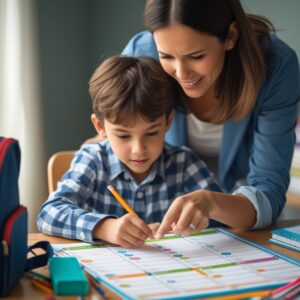Raising children who are both independent and responsible is a target that most parents aspire to reach. We can be the lighthouse in their life and guide them most of the way. Yet it is also important at some stage to give them the power to develop skills through experience.
Independence and responsibility are not things that can be taught to a child in a day or two, but if we as parents take the right steps, we can lead our children on the right path to be self-reliant, responsible, and confident adults. There are a few simplicity ways to cultivate independence and responsibility in your children.
1. Clear Expectations and Limits
Children do well when they’re aware of what is required of them. Establishing clear limits can help kids realize the significance of being responsible. Whatever the task is, i.e., chores, homework or personal behavior, the rules should not change and should be comprehensible. You should have regular dialogs with your kid(s) so that they are clear about their task.
Point: The children will understand clearly what their limits are and, therefore, they will react to their deeds as they know that certain behavior has results. This is helping them to become responsible at this stage.

2. Help Kids Develop Skills for Decision-Making and Problem-Solving
One way to help kids is by letting them make autonomous decisions, and in the process, they develop their critical thinking skills. They might need your help and take some time, but eventually, they would come to appreciate that the ability to make choices indicates being an independent person. Start by allowing them to choose their snacks and gradually, as they grow up, increase their rights to make their choices on their own.
Why It Works: Children assure their decision-making through both successes and mistakes. It’s a trial-and-error process which gives them confidence about their capabilities.

3. Teach Time Management Skills
Instilling proper time management practices in children is one of the best ways there are to engage in a process of developing responsibility. Make them aware of task priority and proper time usage. You can begin with easy tasks such as designing a daily schedule or using timers to do homework or chores. After a while, these habits will become a part of their responsible behavior, as they will get to know how to manage, not only responsibilities but also school, chores, and free time.
Why It Works: Time management education ensures that children know how to schedule their tasks, prioritize them, and be responsible for their duties efficiently.

4. Allow Natural Consequences
Enabling children to see the results of their behavior is one of the very best methods of teaching them responsibility. If a child forgets their homework at home, they’ll have to suffer the consequences and solve the issue at school. If they fail to do the cleaning of their room, they will be unable to find the toy they love. Our task is more of an observatory than that of saving them, but inviting them to experience the natural effects of their decisions tells them that they do matter.
Why It Works: Natural effects are a sound way to imprint the idea that our actions cause reactions and thus to teach both responsibility and self-recognition.

5. Model Responsibility and Independence
Children often copy their parents’ actions. If you wish to develop responsible and independent children, you have to be a good model to them. Explain how to handle your work duties, decide, and also cope with failed attempts. Present the picture of a person who gives food to, washes, massages himself, and tells the time to others, etc. Besides, demonstrate how to undertake your personal work, manage your time and be accountable for your doings, Make sure that they witness these and they are more likely to do the same.
Why it is Successful: Children are always on the lookout for observations and when they see their parents taking charge of the situation, they learn to do the same. Your deeds let the world know who you are better than anything else.

6. Foster a Growth Mindset
Cultivating the idea of a growth mindset in children that mistakes are opportunities for growth is a critical task in the process of creating responsibility and independence. Inspire your children to confront challenges, be innovative, and go through the process of failure for learning. Instead of saying “You can’t do it,” say “You can do it with practice.” This way of thinking will be a means to them to be resilient, a necessary part of independence.
Why It Works: With a growth mindset, kids can reframe problems as opportunities to learn, promoting their ability to be on their own and take responsibility.
7. Give Them Opportunities to Help Others
Children who help others learn to feel with others, become responsible, and develop a sense of purpose. One suggestion is to have them help their brothers/sisters, for example, they may do cleaning, or volunteer work in the neighborhood. These activities will help them realize how their deeds affect other people and thus will make them even more responsible.
Why It Works: By assisting others, children learn how to avoid thinking only of themselves and discover their important part in the larger community.

8. Provide Constructive Feedback
It is not possible to expect children to be perfect, what we can hope for is that they are acquiring the necessary competence and knowledge. In case of offenses from your child, offer him/her not criticism but constructive feedback. His/Her perception of what happened and how to recover next time should be clear to him/her. Making it possible for them to own their responsibility and learn from their experiences if done this way will give a positive result.
Why It Works: A suggestion of feedback helps the children to increase their chances of reaching an appropriate decision and getting the power to act like this is their own choice.
Where to add images: An image of a parent giving feedback to the child in the aftermath of a task or activity would be most fitting at this point.



